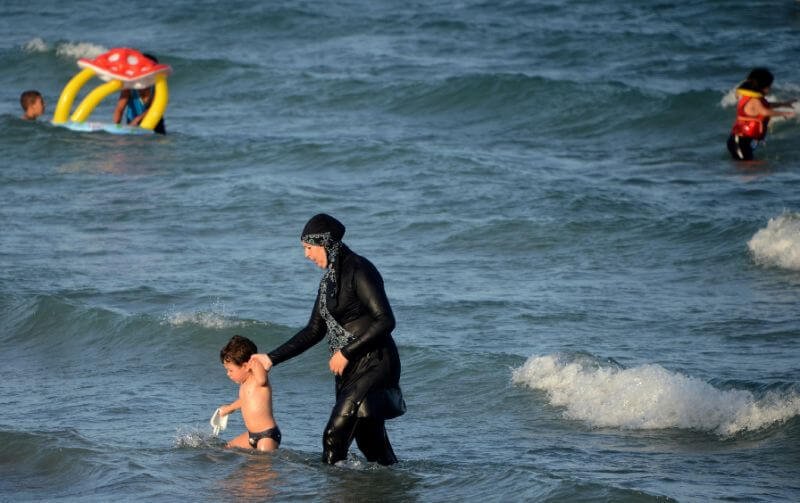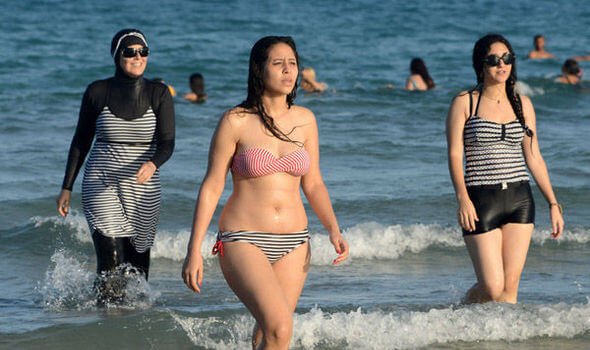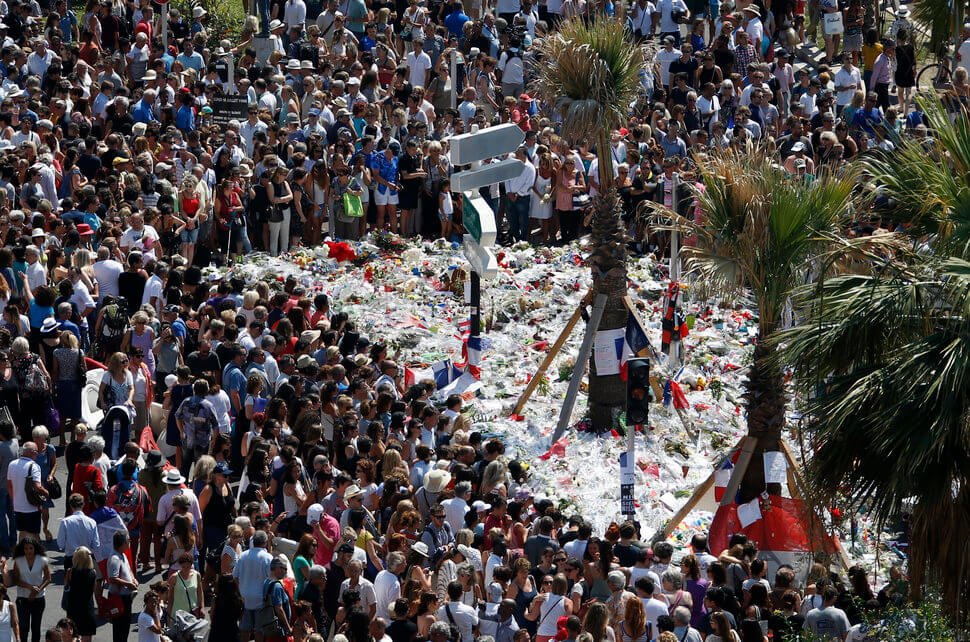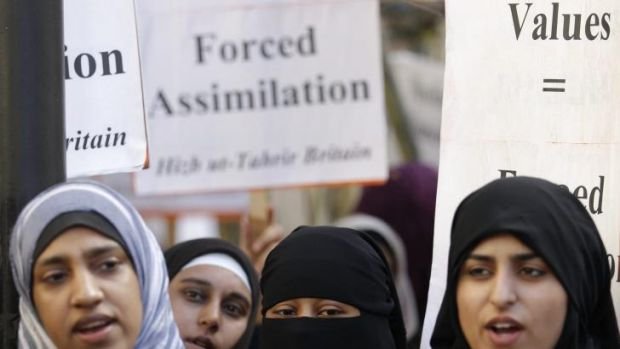Women’s clothing has time and again risen to be a controversial point of discourse in our so called ‘modern’ era. Club that with religion and you have a veritable Pandora’s box, waiting to burst. One such box is yet again threatening to unleash its contents on France, where the recent ‘Burkini’ ban has sparked a fresh round of debate about what constitutes religious secularism and individual autonomy. Or rather, what separates them. For most French people, that separation is a veil.
What in the world is a Burkini?

A Burkini is a type of swimwear Muslim women don to go to the beach and have a splash, while maintaining the precepts of female modesty laid down by Islam. As those with a mind for wordplay might have already guessed, a Burkini is the illegitimate lovechild of a Burka and a Bikini, though it resembles more the latter than the former. It means the Burkini is a completely covered piece of swimwear, something European beach goers apparently cannot digest.
Why are the French against the Burkini?
The Burkini is banned in public pools in France as it is considered unhygienic. Recently the Burkini was banned in several coastal French towns, and a fine of up to 38 Euros levied on women who refused to put on skimpier swimsuits. Conservative French Mayors and politicians of several Mediterranean coastal towns in France have argued that the Burkini, a full-body swimsuit worn by Muslim women, is ‘threat to public order‘.
Marine Le Pen, leader of the rightist National Front wrote in a blog:
“This is the soul of France that is in question, .. France does not lock away a woman’s body, France does not hide half of its population under the fallacious and hateful pretext that the other half fears it will be tempted.”
France’s new Socialist Prime Minister Manuel Valls recently said that the Burkini represented “enslavement of women” and “an archaic vision of a woman’s position in society” which is “not compatible with French values”.
Why are the French really against the Burkini?

Two points come to light here: ‘Women’s position in society’ and ‘French values’.
First, the notion of promoting freedom by curbing freedom is a problematic one. Banning an article of women’s clothing on the grounds of upholding women’s rights to wear whatever they want is contradictory and illogical. How will the ‘enslavement’ of women, as the PM puts it, be over if political regimes keep telling them what they can and can’t wear as free women?
Second, ‘French values’ are something France has struggled with for centuries. According to social scientists and anthropologists, the Burkini ban can be sourced to the famous French fear of losing their ‘Frenchness’, to an attempt to save the ‘French identity‘. It is France’s colonial past, that has given rise to this narrow rigid ‘French identity’, one that was easier to maintain in the colonial era, but has since been constantly under flux due to the increasing multiculturality of France. After all, France holds the largest Muslim minority population in Western Europe.
Terror attacks and the Burkini
Whenever France’s internal security has been disturbed by religious insurgency, especially from Muslim forces, France has responded by reinforcing the French identity, which essentially means assimilating other strands of identity into the French mass, or ejecting them from the system. BAnning of religious displays has always been a political tactic to reaffirm this secular Frenchness.
Be it the 1989 ‘L’affaire du foulard‘, (the affair of the scarf) when three Muslim schoolgirls were suspended for refusing to take off their scarf, incidentally, right about the the time when some Algerians formed the extremist, Islamic Salvation Front. Or 2004, when France banned scarves and headgears (Hijaabs) from schools, including burkas, balaclavas, niqaabs, and Jewish skullcaps, even as the western world reeled under the ashes of 9/11 and the ensuing radicalization of European Muslims. In 2010, all forms of face coverings were nationally banned in France. This meant the Burka and the niqaab as well.

Thus it is hardly surprising that talk of the ban comes smack after the recent spate of terror attacks in France, most of them claimed by Islamic extremists. The last year alone has seen almost four major ISIS backed attacks, including the Bastille Day attack and November 2015 Paris attack among others.
French Secularism or French discrimination?
Though the ‘Veil Laws’ of France have been criticised for being narrow and restrictive in its definition of secularism and freedom, the majority of the French population highly approves of the legislations. French ‘Laïcité’ or secularism requires a complete separation of Church and State. According to French sensibility, this requires a disdain from all forms of religious display, specially in classrooms where the initial drama of the veil played out. Even in French politics, French citizenship is a matter completely outside of the said citizen’s religious tendency or lack of it. In 2012, the European Court also upheld France’s Burka ban law, finding nothing wrong with it.

But this version of secularism is increasingly becoming a tool for restriction and discrimination. Islamic religious bodies have decried the ban as an assault on the Islamic way of life in France. Sociologists and filmmakers such as Agnès de Féo, have gone so far as to say that they ‘created a monster’ with the Veil law.
To Burkini or not to Burkini
The key term here is this: French Muslim. In theory, the French brand of secularism is a beautifully crafted machinery, that ensures freedom and choice. For a French Muslim, this machine is supposed to ensure both their Frenchness and Muslimness, both of which are inclusive and exclusive of each other. Sadly, current interpretations of ‘Laïcité’ are ensuring neither.

And as far as the feminist argument goes, showcasing French Muslim women as poor victims of Islam, who need to be rescued out of their misery by the French government is a pejorative approach to both feminism and communitarianism. When feminism and wardrobes are concerned, freedom does not only imply a world where women are not told what to wear. It also implies one where women are not told what NOT to wear.
Feature Image Source: Reuters

















